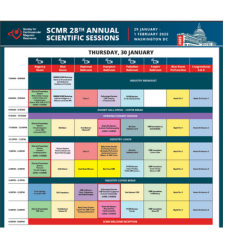Walter R. Witschey, PhD
Associate Professor of Radiology
Perelman School of Medicine, University of Pennsylvania
Dr. Walter Witschey is Associate Professor of Radiology, Associate Vice Chair of Research IT, and Director of the Advanced Cardiovascular Imaging Lab at the University of Pennsylvania. His core research focus is cardiac resonance imaging (CMR) and other imaging technologies and artificial intelligence. His lab uses a multidisciplinary and translational approach, integrating techniques from electrical engineering, computer science, biology and bioengineering. Our techniques include MR physics and pulse sequence development (T1ρ and quantitative susceptibility mapping / QSM) and MR spectroscopy (1H downfield MRS), non-proton imaging and spectroscopy (23Na and 31P), machine learning and computer vision, and closed-loop systems for medical imaging. His translational research interests are in myocardial ischemia and coronary artery disease, reperfusion injury, non-ischemic heart disease, congenital heart disease and metabolic imaging of the heart. He has mentored more than 25 predoctoral students, 7 graduate students, and 5 postdoctoral fellows across multiple departments of Radiology, Bioengineering and Electrical Engineering since he was appointed to the faculty at Penn. He has led several NIH projects and is the co-PI (with Paco Bravo, MD) of NHLBI R01 HL169378 “Non-invasive imaging of reactive oxygen species in reperfusion injury myocardial infarction”, which is a longitudinal study of novel cardiac MRI and PET methods for reactive oxygen species in a large animal model of myocardial infarction and NHBLI R01 HL171709 (with Saman Nazarian, MD) of "Longitudinal association of post-infarct lipomatous metaplasia and malignant arrhythmia". He is also the PI of NCBIB P41 “Center for Advanced Metabolic Imaging in Precision Medicine” technology research & development project “Downfield spectroscopy at ultrahigh fields”. He was PI of an NHLBI grant R00 HL108157 which showed that non-gadolinium based T1ρ MRI could determine myocardial fibrosis after infarction and has led several studies to determine myocardial fibrosis in single ventricle patients using parametric mapping and T1ρ cardiovascular magnetic resonance.
Presentation(s):
-
Emerging Contrasts for Cardiac MRI
Thursday, January 30, 2025
1:30 PM - 1:45 PM East Coast USA Time -
Thursday, January 30, 2025
2:10 PM - 2:20 PM East Coast USA Time -
Friday, January 31, 2025
11:40 AM - 11:50 AM East Coast USA Time -
Friday, January 31, 2025
3:30 PM - 3:40 PM East Coast USA Time

